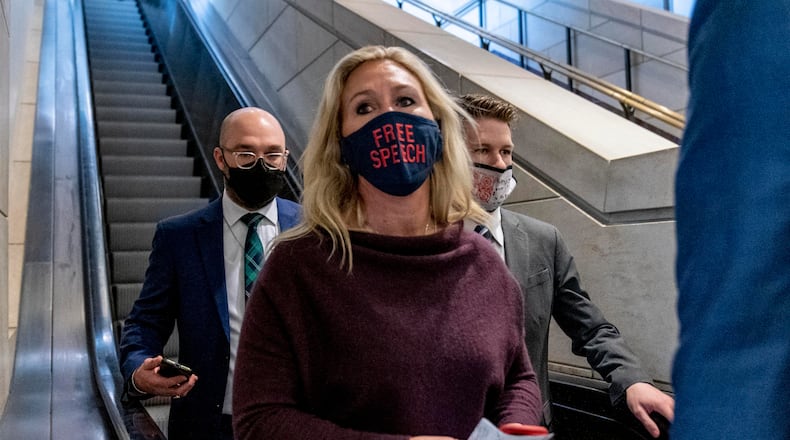WASHINGTON — Two lower courts have refused to throw out fines U.S. Rep. Marjorie Taylor Greene and two other Republicans received after they refused to wear masks on the House floor during the height of the coronavirus pandemic.
Now, the trio has asked the U.S. Supreme Court to review their case.
Greene and her co-defendants, Reps. Thomas Massie of Kentucky and Ralph Norman of South Carolina, each faced financial penalties after refusing to mask up during floor votes in 2021. Then-House Speaker Nancy Pelosi had implemented an escalating fine system for infractions.
While Massie and Norman protested only briefly, Greene continued to show up for votes without a mask for most of 2021 and into 2022. She eventually accumulated more than $100,000 in fines, which were docked from her $174,000 annual salary.
Greene, who said she declined to be vaccinated against the coronavirus, has downplayed the impact of the pandemic and accused Democratic elected officials of abusing authority during the period of lockdowns and mandates. She currently serves on a House select committee reviewing the government response to COVID-19.
In March 2022, a U.S. district judge in Washington threw out the lawmakers’ case. The judge rejected their argument that the fines amounted to an illegal reduction in their annual salary and said Pelosi and her staff cannot be sued for decisions made in their government capacity.
The U.S. Court of Appeals for the D.C. Circuit upheld that ruling in June. Now, the trio’s attorney is making some of those same arguments to the Supreme Court in hopes that enough justices will agree that their case deserves another look.
With Republicans now in the majority in the U.S. House, it is unclear who will respond on behalf of the former speaker, who remains in office but as a rank-and-file member. The deadline to do so is Dec. 27.
Eventually, the case will be passed along to justices and placed on the agenda for discussion at one of their private conferences. If justices agree to review the case, it will be scheduled for oral arguments in the coming months.
But the petition is a long shot. The Supreme Court receives 5,000 to 6,000 petitions for case reviews each term but usually agrees to hear 60 to 70 cases.
About the Author
Keep Reading
The Latest
Featured



